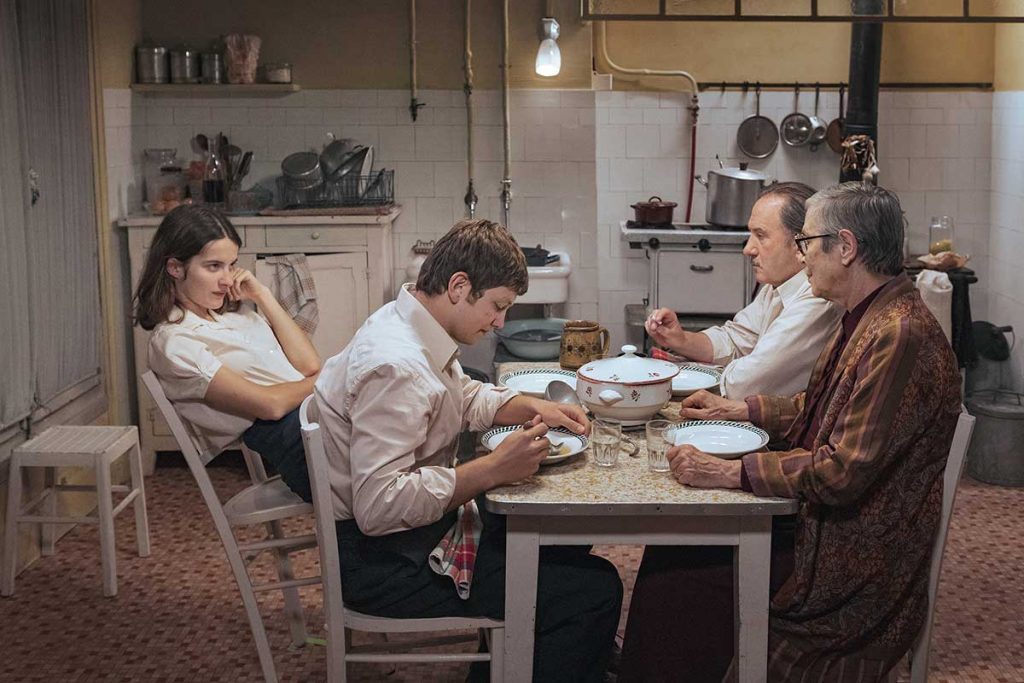Rebecca Marder shines in A Radiant Girl (Une Jeune Fille Qui Va Bien), a charming debut that tackles its subject matter with unique energy and personality.
The subject of the holocaust has been approached so many times in cinema in the past, and we’ve seen the release of so many films, belonging to different genres, that tackled the same issues from different angles. We’ve seen adaptations like The Diary of Anne Frank (1959) and The Pianist (2002), countless World War 2 documentaries, fictionalised retellings like Life is Beautiful (1993) and Schindler’s List (1997), and modern gems like Jojo Rabbit and Quo Vadis, Aida?. Our familiarity with the tragic events that took place in one of the darkest times in human history makes it so that we’re always painfully aware of what’s going to happen in each and every one of these films, and, as we get acquainted with their characters, we can’t help but anticipate the events to come.
And it’s exactly due to our knowledge of both the historical events and this specific subgenre that it’s hard for a film about the holocaust not to feel either predictable or exploitative, nowadays. While I’m not one hundred percent sure that A Radiant Girl (Une Jeune Fille Qui Va Bien) is neither of those things, what actress, writer and director Sandrine Kiberlain (Betty Fisher and Other Stories, Mademoiselle Chambon) has crafted in her feature directorial debut is a film with unique energy and personality. Screened in competition at the 2021 Torino Film Festival, A Radiant Girl is, at the same time, a snapshot of a very specific moment in time and a thoughtful character study that is always in movement, drawing us into the ever-shifting world of its complex, fascinating protagonist.
Just like the film’s original title suggests, the protagonist in question is a jeune fille qui va bien, which literally translates to “a young woman who is doing just fine.” And, when we first meet Irène (Rebecca Marder, of Someone, Somewhere, from the Comédie Française), that’s exactly what it looks like, as she’s somehow managing to juggle her hectic schedule not only in an admirable way but also with unparalleled energy. During the day, Irène splits her time between her job as a theatre usher and rehearsals for a very important audition that she hopes will get her closer to fulfilling her dream of becoming an actress.
In the evening, she goes home to her family, and spends time with her brother, Igor (Anthony Bajon, of The Prayer), her father, André (André Marcon, of An Officer and A Spy), and her grandmother, Marceline (Françoise Widhoff, of Spring Blossom), with whom she can unleash all her creativity and be her wonderful, unique self. But that’s not all: as well as a hectic work-life routing, Irène is also dealing with the flushes of first love, as she finds herself with not one but two potential beaus, poetic old acquaintance Gilbert (Jean Chevalier, of the Comédie Française) and charming stranger Jacques (Cyril Metzger, of Happening).

Despite the occasional dizzy spell, our protagonist seems to be leading a vibrant life, her larger-than-life personality enveloping everyone around her, so much so that, when her theatre partner Jo (Ben Attal, of The Accusation) suddenly stops coming to rehearsals, Irène manages to convince her best friend Viviane (India Hair, of Trois Amies) to take his place at the audition. And so, Irène keeps living her life without a care in the world, as she tries to decipher her feelings towards a new acquaintance while never neglecting her passion for theatre.
But it is 1942, and Irène is Jewish – a fact that we’re always aware of, no matter how hard both the film’s protagonist and the film itself try to avoid the subject. In fact, the war takes place in A Radiant Girl one clue after the other: there are no Nazi flags, just like there aren’t any dramatic raids or heartbreaking farewells. Instead, Sandrine Kiberlain (who wrote the film’s screenplay as well as directing it) cleverly provides us with tiny but highly significant details that add an ominous undertone to this cheerful, quirky film. First, it’s Irène’s father asking her music teacher to classify her as “half-Jewish” in the school’s official documents, a “half-lie” that might enable her to continue her education. Then, it’s a stamp on the family’s passports, and a decree that requires them to get rid of certain items in their houses.
Throughout the film, we identify with Irène when she deals with universal issues that we’ve also faced at some point in our lives, from the struggles to achieve one’s dream or to the insecurities that come with first love. But, the more we relate with the film’s captivating, larger-than-life protagonist, the more we are aware that something else is taking place around her that we’re not being shown – something no one should ever have to experience.
To say anything more would spoil the many twists that await you in the film, and those include more than one endearing moment and several wonderfully absurd, hilarious exchanges that mainly involve Irène’s brother, as well as a great deal of underlying tension and one scene in particular, towards the end, that should come as a surprise but really doesn’t, which is partly the film’s downfall. That said, A Radiant Girl is still one of those films that you rarely come across, as it manages to take a very familiar subject and deliver a mostly original, one-of-a-kind movie that will have your eyes glued to the screen for its entire duration.
Though the film’s screenplay is partially to credit for the success of a movie where what’s left unsaid is more important than what we get to see, it’s Rebecca Marder‘s performance that breathes life into the film, presenting us with a sympathetic, multifaceted protagonist who might be eccentric and even excessive in her behaviour but who never fails to feel authentic, even when her world is at its most absurd. It’s thanks to Marder that Irène always wears her emotions on her sleeve, even though she carefully selects what she chooses to see – a fact that’s made even more clear by Irène’s quest for prescription glasses she doesn’t really need – and the result is a performance that strikes the right emotional chords. The supporting cast is also excellent, and the standouts are, without a doubt, Françoise Widhoff, André Marcon and Anthony Bajon, whose undeniable chemistry as Irène’s grandmother, father and brother makes the many scenes they share simply irresistible.
Part coming-of-age movie, part quirky comedy, part tense holocaust drama, A Radiant Girl (Une Jeune Fille Qui Va Bien) balances the darkness of its themes with the light that comes from its protagonist, brilliantly brought to life by Rebecca Marder. Both a vibrant character study and a haunting meditation on one of the most tragic events in history, Kiberlain’s drama will make you go through a whole range of emotions, ultimately leaving you not just with an aftertaste but also with the urge to live life to the fullest.
A Radiant Girl (Une Jeune Fille Qui Va Bien) is now available to watch on digital and on demand.

